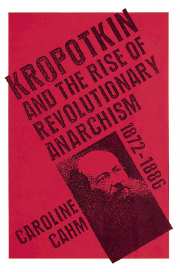Book contents
- Frontmatter
- Contents
- Preface
- Acknowledgements
- Introduction
- Part I Kropotkin and the development of the theory of anarchist communism
- Part II Kropotkin and the development of anarchist ideas of revolutionary action by individuals and small groups (1872–1886)
- 3 Revolutionary action and the emergent anarchist movement of the seventies
- 4 Propaganda by deed: the development of the idea
- 5 Kropotkin and propaganda by deed
- 6 Kropotkin and acts of revolt
- 7 The Congress of London 1881 and ‘The Spirit of Revolt’
- 8 The trial of Lyon 1883 and response to persecution
- Part III Kropotkin and the development of anarchist views of collective revolutionary action (1872–1886)
- Conclusion
- Notes
- Bibliography
- Index
3 - Revolutionary action and the emergent anarchist movement of the seventies
Published online by Cambridge University Press: 14 September 2009
- Frontmatter
- Contents
- Preface
- Acknowledgements
- Introduction
- Part I Kropotkin and the development of the theory of anarchist communism
- Part II Kropotkin and the development of anarchist ideas of revolutionary action by individuals and small groups (1872–1886)
- 3 Revolutionary action and the emergent anarchist movement of the seventies
- 4 Propaganda by deed: the development of the idea
- 5 Kropotkin and propaganda by deed
- 6 Kropotkin and acts of revolt
- 7 The Congress of London 1881 and ‘The Spirit of Revolt’
- 8 The trial of Lyon 1883 and response to persecution
- Part III Kropotkin and the development of anarchist views of collective revolutionary action (1872–1886)
- Conclusion
- Notes
- Bibliography
- Index
Summary
Manifestly, the anarchists, in denouncing the idea of the formation of a workers' party committed to involvement with parliamentary politics and political action, had to have a real alternative beyond pure abstensionism and revolutionary rhetoric about popular revolutionary action. In the seventies, they faced two major threats to the credibility of the anti-statist, anti-political position, when it came to transforming theory into action. On the one hand, there was the increasing influence on the European socialist movements of the German social democrats, arising out of the latter's success in building up enough popular response to secure an increasing number of seats in the Reichstag under, and in spite of, a repressive régime. On the other, there was the disillusionment of revolutionary socialists like Malon, Brousse and Costa who, disheartened by the failure of their efforts to provoke popular revolt, gradually abandoned anarchism for parliamentary forms of socialism, partly because they shared the guesdist fear that bourgeois radicals would use the political platform to draw workers away from socialism, and partly because they began to believe that some progress towards socialism could be made through parliamentary institutions.
The policy the anarchists developed in response to all this tended to alternate between revolutionary trade unionism and acts of revolt by individuals and small groups. The two types of action and Kropotkin's role in their development will be examined and followed through in two separate sections. The present section will deal primarily with the latter forms of action which were associated with the notion of propaganda by deed and developed out of the failure of insurrectionary action in the first half of the seventies.
- Type
- Chapter
- Information
- KropotkinAnd the Rise of Revolutionary Anarchism, 1872-1886, pp. 71 - 75Publisher: Cambridge University PressPrint publication year: 1989

